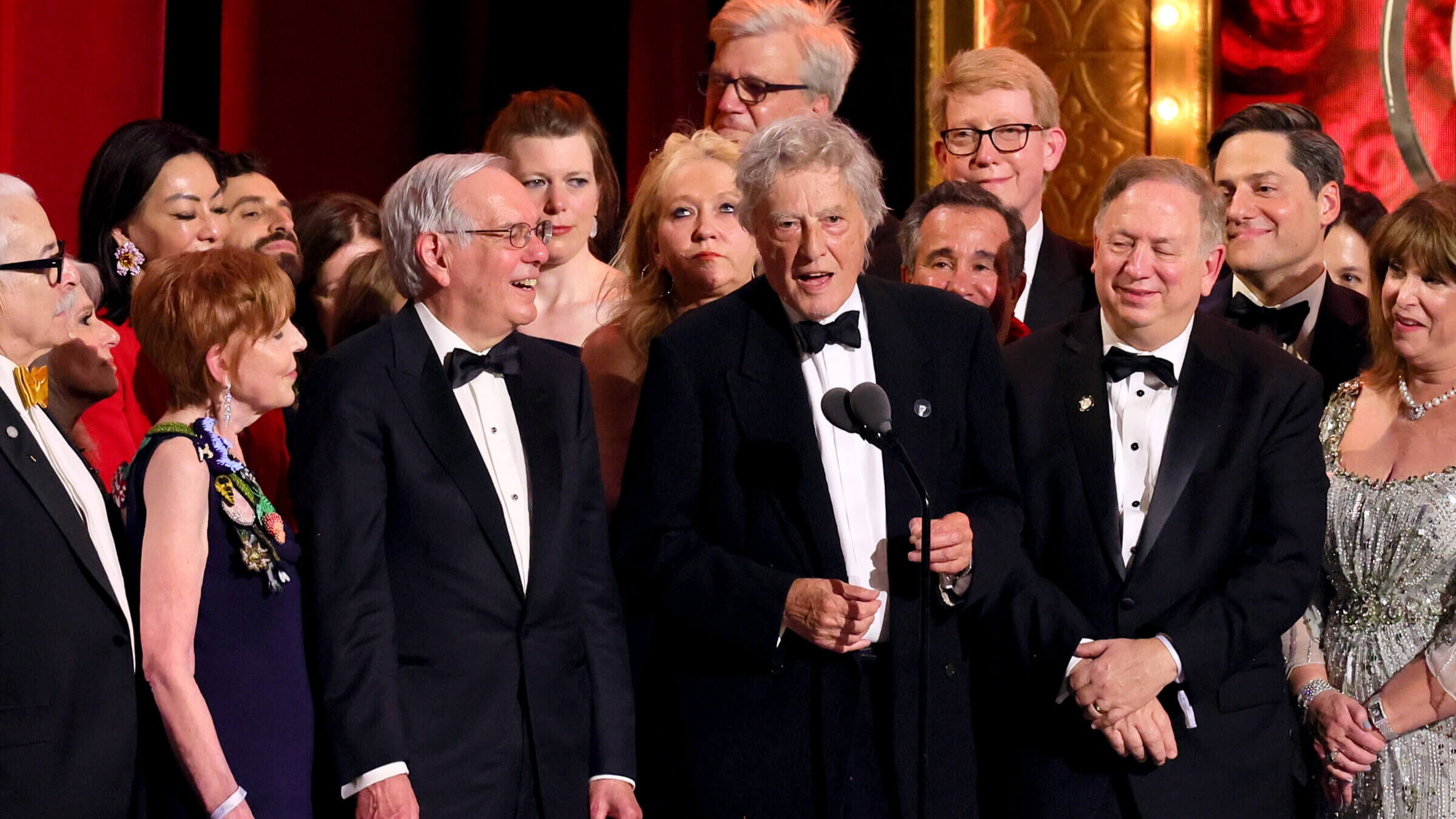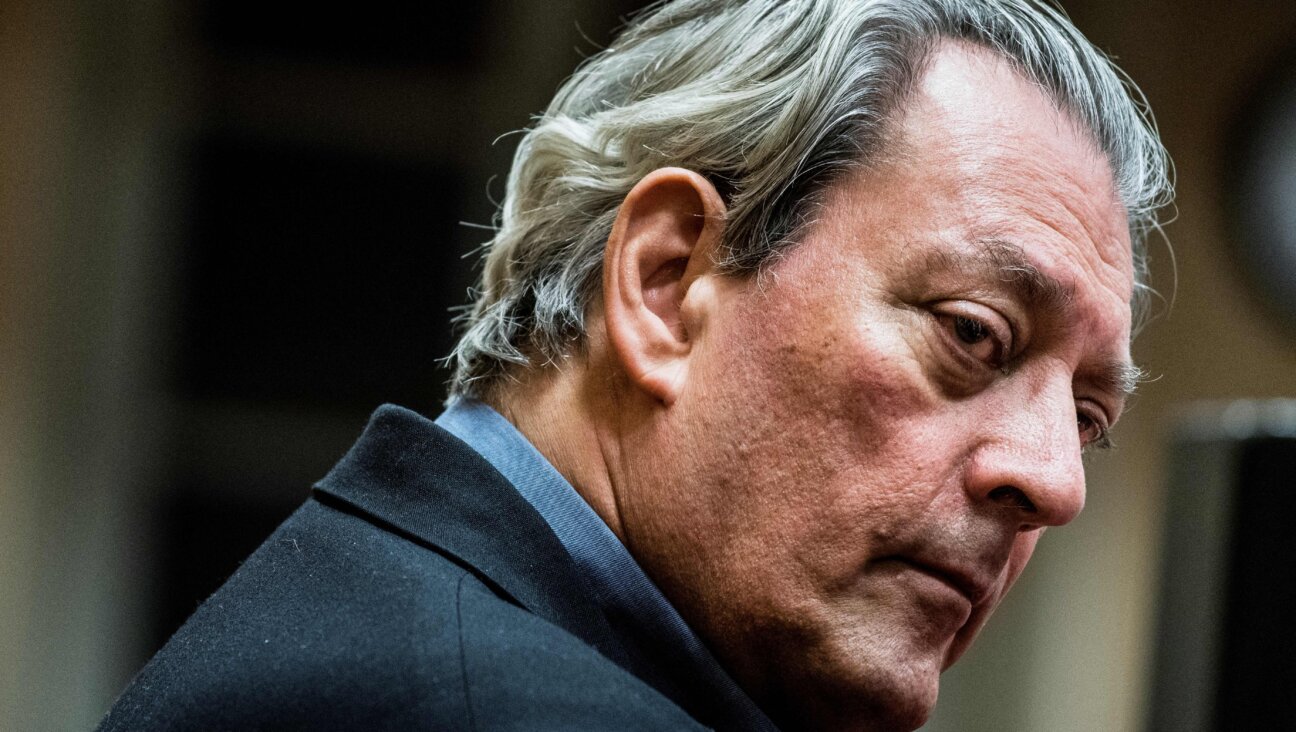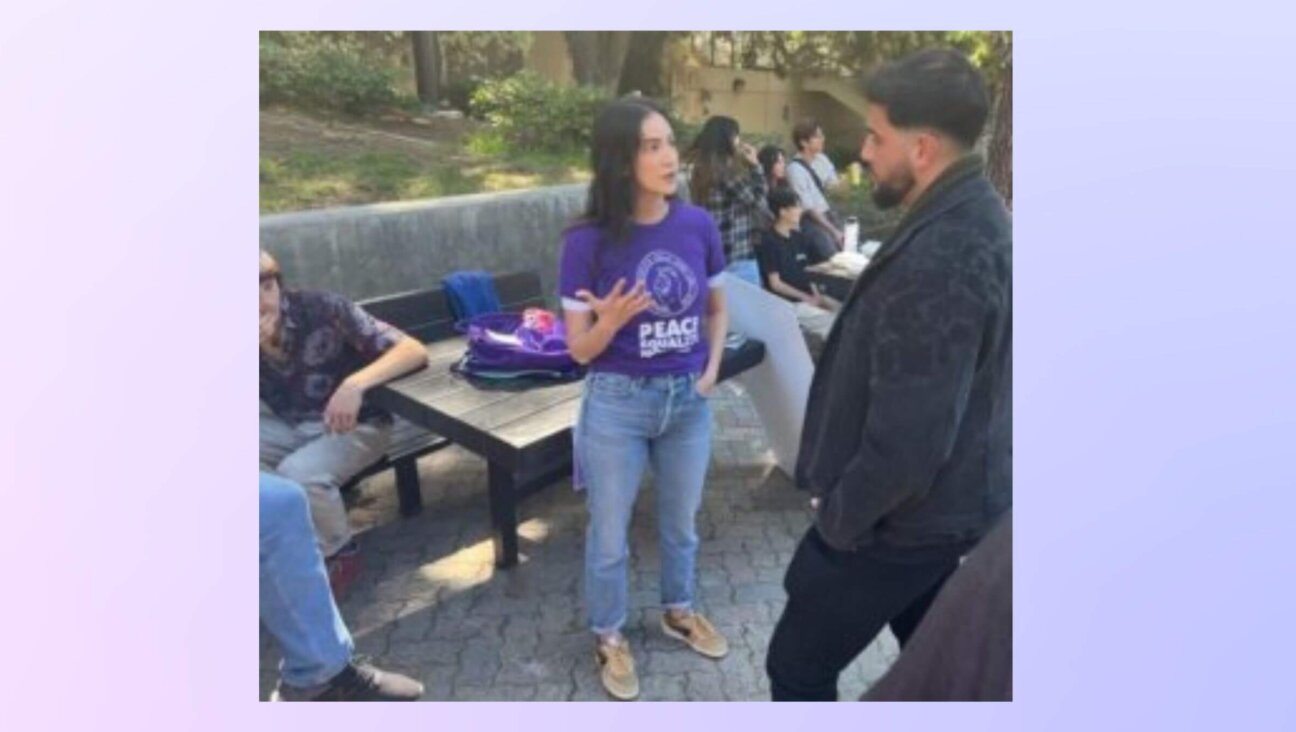The Tonys honored plays about antisemitism — the winners were eager to talk about anything else

Tom Stoppard accepts his award for Leopoldstadt. Photo by NTheo Wargo/Getty Images for Tony Awards Productions
With a WGA strike still raging — and actors not far behind — the 2023 Tonys went off without a script, but still included some moving words. Just not about one of the major themes of the night, antisemitism.
Alex Newell and J. Harrison Ghee made history as the first openly nonbinary performers to win acting categories. Ghee, who plays Jerry/Daphne in Some Like It Hot, dedicated their Tony to “every trans, nonbinary, gender-nonconforming human who ever was told you couldn’t be, you couldn’t be seen.” Newell, who won featured actor for the musical Shucked, said, “I should not be up here as a queer, nonbinary, fat, Black little baby from Massachusetts. And to anyone who thinks they can’t do it — you can do anything you put your mind to.”
Winning for best revival of a play for Topdog/Underdog, Suzan-Lori Parks thanked her cast and director, who “showed up to be large in a world that often does not much want the likes of us living at all.”
Parade director Michael Arden was censored for saying “this f—t has a Tony” to his childhood bullies.
And when Jewish playwright and director Patrick Marber won for his direction of Tom Stoppard’s Leopoldstadt, a multigenerational saga about a Viennese family’s confrontation with antisemitism and the Shoah, he took the moment to … kvetch about how the camera only lingered on actors, not directors.
Well, surely Stoppard, who in the drama finally faced his Jewish background and the Holocaust that decimated his family, waxed poetic about the evils of antisemitism when he won best play.
Not quite. Instead, with a droll, English reserve, he took a moment to say how over many decades he’s witnessed the “theater writer getting progressively devalued in the food chain,” a somewhat tone-deaf takeaway when screenwriters (who typically have less clout than playwrights) are picketing for a living wage.
Alfred Uhry, a Pulitzer Prize winner who wore a spangly Star of David on his lapel, seemed ready to speak up. When his musical Parade, about the lynching of Leo Frank, which was picketed by neo-Nazis on its first preview, won best revival, he would surely deliver a strident message about this story, which, as a Georgia native, haunted him since childhood.
Nope. Uhry was gracious in thanking his company, and noted how, 25 years ago, he won Tony for best book for the same show. To his credit, Jason Robert Brown, his composer, began a sentence “Mary Phagan,” the name of the murdered girl at the center of the Frank trial, but music played him off before he could say more.
Antisemitism was the story of the evening, with Leopoldstadt beating out plays about the criminal justice system, Americans with disabilities and a Black, queer retelling of Hamlet, all of which had previously won Pulitzers. Parade edged out high-profile Sondheim revivals and a Sorkinized Camelot.
For some reason, the hot topic of Jew hatred slipped the mind of the winners, some of Broadway’s, and the English language’s, most articulate people the minute they stepped up to the mic. Watching their speeches out of context, you’d have no idea that what their plays were even about.
It wasn’t all a wash. Brandon Uranowitz, who won featured actor for Leopoldstadt, thanked Stoppard for “writing a play about Jewish identity and antisemitism and the false promise of assimilation with the nuances and the complexities and the contradictions that they deserve.” He also thanked him on behalf of his ancestors “many of whom did not make it out of Poland.” (Stoppard did not touch on the personal character of his play, or the family he lost, in his remarks.)
Michael Arden, who isn’t Jewish, spoke eloquently about Parade’s theme of intolerance and how it connects to all forms of oppression, particularly that now directed at trans, queer and nonbinary youth. It’s a shame that both young leads, Micaela Diamond and Ben Platt, praised by Uhry as the next generation and very vocal about antisemitism, were passed over by the Tony voters and did not have a chance to say their piece.
Stoppard, Marber and Uhry’s speeches weren’t just a missed opportunity — they were a sort of malpractice. I understand how insisting on the urgency of the awarded work can come off preachy. I know they have lists of people to thank and, in the moment, may not have the time or presence of mind to say everything.
But when your work’s message demands to be heard by people who may never make it to Broadway, it’s a responsibility to emphasize how these plays set in the late 19th and 20th centuries meet the moment. Without that commentary and amid all the breakthrough wins of recent years, it looks like old, rich white men are taking the top prizes (once again) for fussy, irrelevant period pieces. It’s all the more maddening for how easy it would have been to correct that impression.
The day before the telecast, Nazis gathered outside Disney World with swastika flags and caricatures of hand-wringing Jews. The owner of Twitter interacted with the CEO of Gab, where the Pittsburgh shooter aired his Jew hate before killing 11 in a synagogue. The banning of books about the Holocaust from school libraries is ongoing, alongside a general crackdown on LGBTQ+ expression. None of these flashpoints, as bright as a midtown marquee, seemed worth a mention.
Of course I’m glad that these plays are being honored — though I thought Leopoldstadt was just OK, and more than a little evasive. I only wish the minds behind these stories had more to say. When it came to Sunday’s ceremony, the wrong writers were on strike.

I hope you appreciated this article. Before you go, I’d like to ask you to please support the Forward’s award-winning, nonprofit journalism during this critical time.
Now more than ever, American Jews need independent news they can trust, with reporting driven by truth, not ideology. We serve you, not any ideological agenda.
At a time when other newsrooms are closing or cutting back, the Forward has removed its paywall and invested additional resources to report on the ground from Israel and around the U.S. on the impact of the war, rising antisemitism and the protests on college campuses.
Readers like you make it all possible. Support our work by becoming a Forward Member and connect with our journalism and your community.
Make a gift of any size and become a Forward member today. You’ll support our mission to tell the American Jewish story fully and fairly.
— Rachel Fishman Feddersen, Publisher and CEO
Join our mission to tell the Jewish story fully and fairly.























